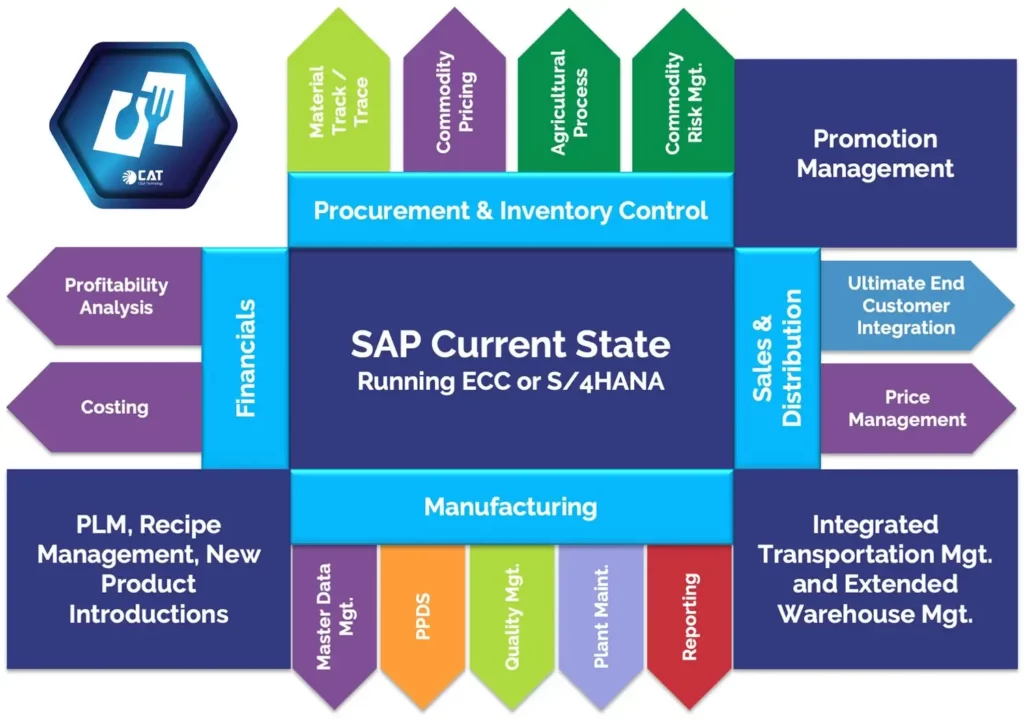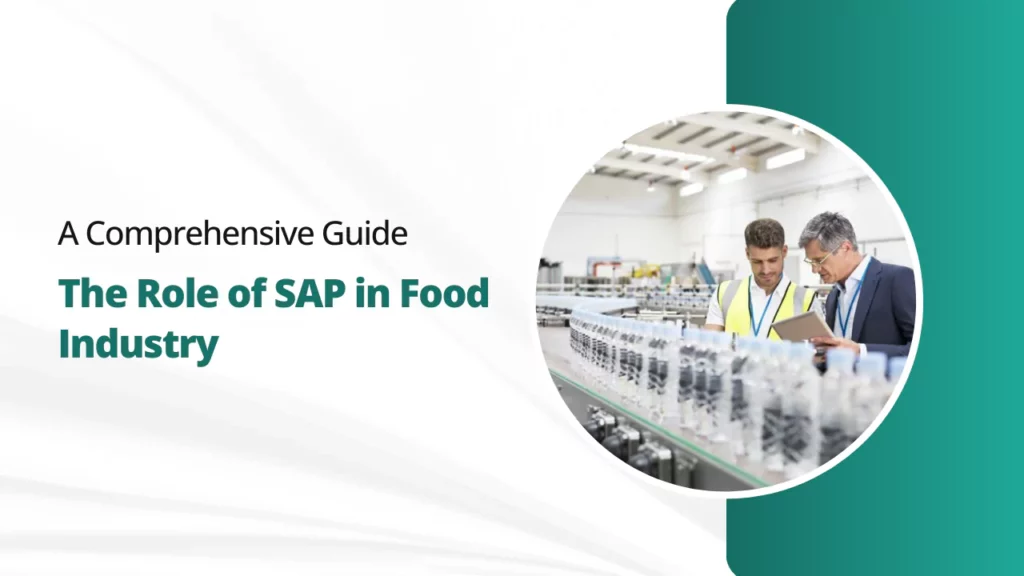SAP is a leading provider of ERP software and is used by businesses of all sizes across a wide range of industries. The food industry is no exception. SAP in food industry can help food businesses streamline their operations. It can improve business efficiency and boost profitability. In this era, there is a need for food businesses to adopt cutting-edge technologies to stay ahead of the curve. SAP provides them with the tools they need to manage their operations more effectively. This comprehensive guide will explore how SAP can be used in the food industry.
Benefits of using SAP in Food Industry

There are many benefits to using SAP in food industry. Some of the key benefits include:
Improved efficiency:
SAP can help food businesses improve efficiency by automating manual tasks. SAP provides a single platform for managing all aspects of the company.
Increased profitability:
SAP can help food businesses increase profitability by reducing costs. This initiative improves productivity and increases sales.
Improved quality control:
SAP can improve quality control by tracking products throughout the supply chain.
Enhanced compliance:
SAP can help food businesses comply with complex industry regulations, such as HACCP and FSMA.
Improved customer service:
SAP can help food businesses improve customer service by providing a real-time view of inventory, orders, and shipments.
SAP Solutions for Food Businesses
SAP offers a wide range of solutions designed for the food industry. Some of the most popular SAP solutions for food businesses include:
1. SAP S/4HANA:
SAP S/4HANA is a next-generation ERP solution that can help food businesses manage their operations in real-time.
2. SAP Business One:
SAP Business One is a cloud-based ERP solution ideal for small and medium-sized food businesses.
3. SAP Supply Chain Management (SCM):
SAP SCM is a suite of solutions that can help food businesses manage their supply chains more effectively.
4. SAP Manufacturing Execution System (MES):
SAP MES can help food businesses automate manufacturing processes and improve quality control.
5. SAP Product Lifecycle Management (PLM):
SAP PLM can help food businesses manage the development and launch of new products.
How to Implement SAP in Food Industry
Implementing SAP in food industry is a complex process. However, it can be advantageous for businesses that do it right. Here are a few tips for implementing SAP in food industry:
1. Plan carefully:
Before you start implementing SAP, it is crucial to develop a detailed plan. This plan should include your goals for the implementation, your budget, and your timeline. You should also identify the key stakeholders involved in the performance. Also, develop a communication plan to keep them informed of the progress.
2. Get the right team in place:
It is essential to assemble a team of experienced professionals to help you implement SAP. This team should include people with expertise in SAP, the food industry, and your business. You may also need to hire external consultants to help with the implementation
3. Customize SAP to your business needs:
SAP is a very flexible solution, but it is essential to customize it to meet the specific needs of your business. This may involve adding or removing functionality or changing how SAP is used. It is essential to work with a qualified SAP partner to ensure that the customization is done correctly and that it does not impact the performance of SAP.
4. Train your employees on SAP:
It is essential to train your employees on how to use SAP effectively. This will help to ensure that SAP is used correctly and that employees can get the most out of the system. SAP offers a variety of training resources, including online courses, instructor-led training, and on-the-job training.
5. Go live with SAP:
Once SAP has been implemented and customized, it is time to go live with the system. This involves migrating your data to SAP and training your employees on how to use the system in production. It is essential to carefully plan the go-live process to minimize disruption to your business.
Features of SAP for the Food Process Industry
1. Recipe Management:
SAP can help food businesses to manage their recipes more effectively. This includes the ability to create, store, and manage recipes; track the usage of ingredients, and calculate the cost of goods sold.
2. Production Planning:
SAP can help food businesses to plan their production more effectively. This includes the ability to create and manage production schedules, track inventory levels, and identify and address potential bottlenecks.
3. Quality Control:
SAP can help food businesses to improve their quality control processes. This includes the ability to track products throughout the supply chain, identify and address quality problems, and generate reports that demonstrate compliance with food safety regulations.
4. Traceability:
SAP can help food businesses to track their products throughout the supply chain. This includes the ability to track products from farm to fork, identify the source of ingredients, and generate reports that demonstrate traceability.
5. Food Safety Compliance:
SAP can help food businesses to comply with complex food safety regulations. This includes the ability to track product recalls, manage food safety programs, and generate reports that demonstrate compliance.
6. Supply Chain Management:
SAP can help food businesses manage their supply chains more effectively. This includes the ability to plan and optimize supply chains, track inventory levels, and collaborate with suppliers and customers.
7. Financial Management:
SAP can help food businesses to manage their finances more effectively. This includes the ability to track expenses and revenues, generate financial reports, and make better financial decisions.
Conclusion:
SAP offers a comprehensive suite of solutions to help food businesses of all sizes improve their operations and become more successful. SAP’s solutions are designed to help food businesses address the unique challenges they face. SAP can also help food businesses to develop new products more quickly. It improves their manufacturing processes, reaches new customers, and improves customer service.
If you are a food business owner, We encourage you to consider implementing SAP. SAP can help you to achieve your business goals and to become more successful. For a professional SAP implementation, contact us.




